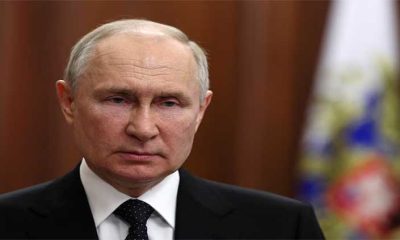A top Hamas political official told The Associated Press the Islamic militant group is willing to agree to a truce of five years or more with Israel and that it would lay down its weapons and convert into a political party if an independent Palestinian state is established along pre-1967 borders.
The comments by Khalil al-Hayya in an interview Wednesday came amid a stalemate in months of talks for a cease-fire in Gaza. The suggestion that Hamas would disarm appeared to be a significant concession by the militant group officially committed to Israel’s destruction.
But it’s unlikely Israel would consider such a scenario. It has vowed to crush Hamas following the deadly Oct. 7 attacks that triggered the war, and its current leadership is adamantly opposed to the creation of a Palestinian state on lands Israel captured in the 1967 Mideast war.
Al-Hayya, a high-ranking Hamas official who has represented the Palestinian militants in negotiations for a cease-fire and hostage exchange, struck a sometimes defiant and other times conciliatory tone.
Speaking to the AP in Istanbul, Al-Hayya said Hamas wants to join the Palestine Liberation Organization, headed by the rival Fatah faction, to form a unified government for Gaza and the West Bank. He said Hamas would accept “a fully sovereign Palestinian state in the West Bank and Gaza Strip and the return of Palestinian refugees in accordance with the international resolutions,” along Israel’s pre-1967 borders.
If that happens, he said, the group’s military wing would dissolve.
“All the experiences of people who fought against occupiers, when they became independent and obtained their rights and their state, what have these forces done? They have turned into political parties and their defending fighting forces have turned into the national army,” he said.
Over the years, Hamas has sometimes moderated its public position with respect to the possibility of a Palestinian state alongside Israel. But its political program still officially “rejects any alternative to the full liberation of Palestine, from the river to the sea” — referring to the area reaching from the Jordan River to the Mediterranean Sea, which includes lands that now make up Israel.
Al-Hayya did not say whether his apparent embrace of a two-state solution would amount to an end to the Palestinian conflict with Israel or an interim step toward the group’s stated goal of destroying Israel.
There was no immediate reaction from Israel or the Palestinian Authority, the internationally recognized self-ruled government that Hamas drove out when it seized Gaza in 2007, a year after winning Palestinian parliamentary elections. After the Hamas takeover of Gaza, the Palestinian Authority was left with administering semi-autonomous pockets of the Israeli-occupied West Bank.
The Palestinian Authority hopes to establish an independent state in the West Bank, east Jerusalem and Gaza — areas captured by Israel in the 1967 Mideast war. While the international community overwhelmingly supports such a two-state solution, Israeli Prime Minister Benjamin Netanyahu’s hard-line government rejects it.
The war in Gaza has dragged on for nearly seven months and cease-fire negotiations have stalled. The war began with the deadly Oct. 7 attack on southern Israel in which Hamas-led militants killed about 1,200 people, mostly civilians. Militants dragged some 250 hostages into the enclave. The ensuing Israeli bombardment and ground offensive in Gaza has killed more than 34,000 Palestinians, most of them women and children, according to local health authorities, and displaced some 80% of Gaza’s population of 2.3 million.
Israel is now preparing for an offensive in the southern city of Rafah, where more than 1 million Palestinians have fled to.
Israel says it has dismantled most of the initial two dozen Hamas battalions since the start of the war, but that the four remaining ones are holed up in Rafah. Israel argues that a Rafah offensive is necessary to achieve victory over Hamas.
Al-Hayya said such an offensive would not succeed in destroying Hamas. He said contacts between the political leadership outside and military leadership inside Gaza are “uninterrupted” by the war and “contacts, decisions and directions are made in consultation” between the two groups.
Israeli forces “have not destroyed more than 20% of (Hamas’) capabilities, neither human nor in the field,” he asserted. “If they can’t finish (Hamas) off, what is the solution? The solution is to go to consensus.”
In November, a weeklong cease-fire saw the release of more than 100 hostages in exchange for 240 Palestinian prisoners held in Israel. But talks for a longer-term truce and release of the remaining hostages are now frozen, with each side accusing the other of intransigence. Key interlocutor Qatar has said in recent days that it is undertaking a “reassessment” of its role as mediator.
Most of Hamas’ top political officials, previously based in Qatar, have left the Gulf country in the past week and traveled to Turkey, where Hamas political leader Ismail Haniyeh met with Turkish President Recep Tayyip Erdogan on Saturday. Al-Hayya denied a permanent move of the group’s main political office is in the works and said Hamas wants to see Qatar continue in its capacity as mediator in the talks.
Israeli and U.S. officials have accused Hamas of not being serious about a deal.
Al-Hayya denied this, saying Hamas has made concessions regarding the number of Palestinian prisoners it wants released in exchange for the remaining Israeli hostages. He said the group does not know exactly how many hostages remain in Gaza and are still alive.
But he said Hamas will not back down from its demands for a permanent cease-fire and full withdrawal of Israeli troops, both of which Israel has balked at. Israel says it will continue military operations until Hamas is definitively defeated and will retain a security presence in Gaza afterwards.
“If we are not assured the war will end, why would I hand over the prisoners?” the Hamas leader said of the remaining hostages.
Al-Hayya also implicitly threatened that Hamas would attack Israeli or other forces who might be stationed around a floating pier the U.S. is scrambling to build along Gaza’s coastline to deliver aid by sea.
“We categorically reject any non-Palestinian presence in Gaza, whether at sea or on land, and we will deal with any military force present in these places, Israeli or otherwise … as an occupying power,” he said.
Al-Hayya said Hamas does not regret the Oct. 7 attacks, despite the destruction it has brought down on Gaza and its people. He denied that Hamas militants had targeted civilians during the attacks — despite overwhelming evidence to the contrary — and said the operation succeeded in its goal of bringing the Palestinian issue back to the world’s attention.
And, he said, Israeli attempts to eradicate Hamas would ultimately fail to prevent future Palestinian armed uprisings.
“Let’s say that they have destroyed Hamas. Are the Palestinian people gone?” he asked.
Post Views: 4


 Fashion3 months ago
Fashion3 months ago
 Sports3 months ago
Sports3 months ago
 Sports3 months ago
Sports3 months ago
 Fashion2 months ago
Fashion2 months ago
 pakistan3 months ago
pakistan3 months ago
 World3 months ago
World3 months ago
 pakistan3 months ago
pakistan3 months ago
 Tech3 months ago
Tech3 months ago



















